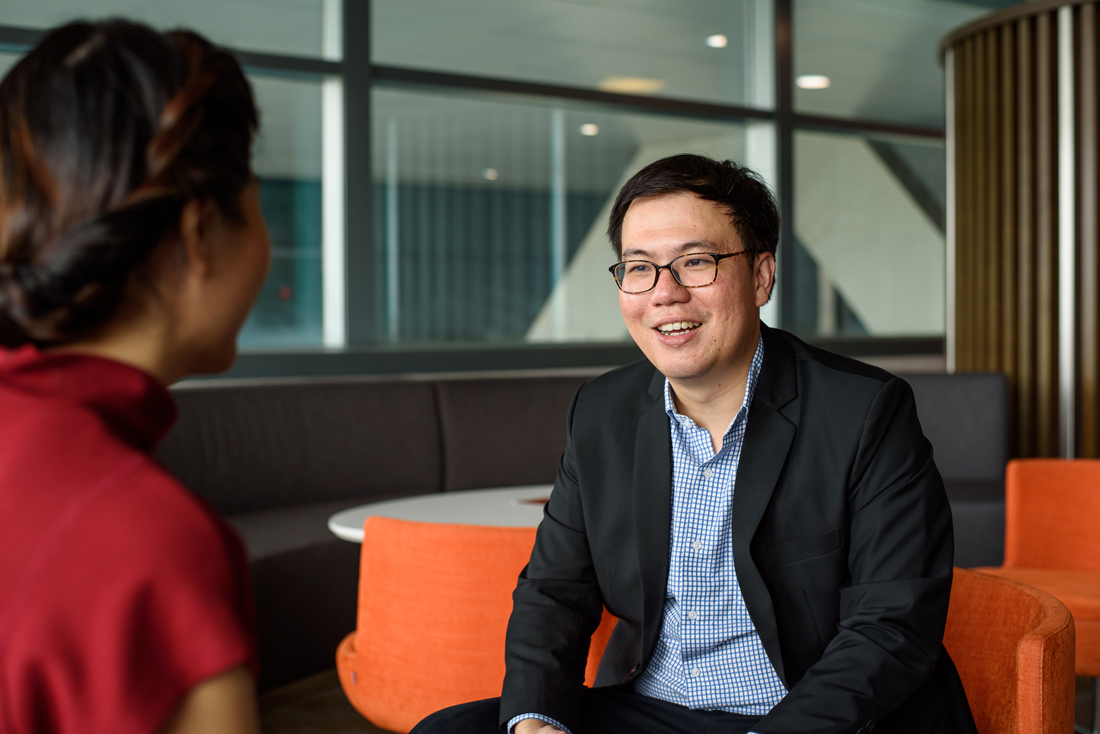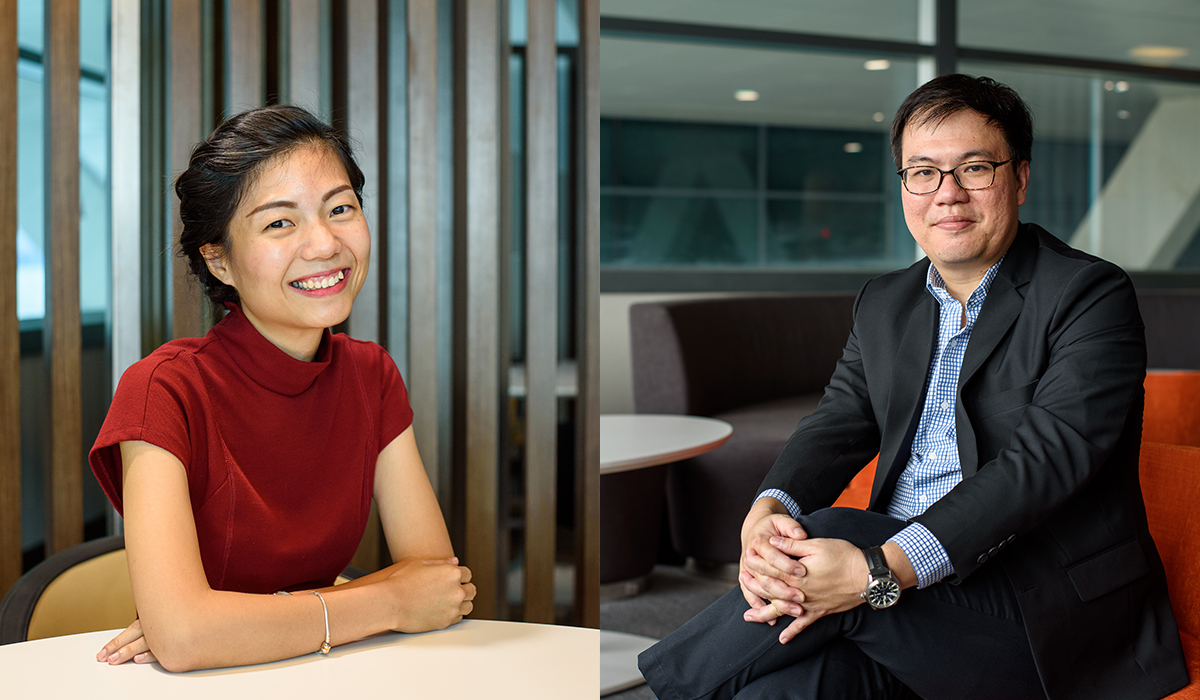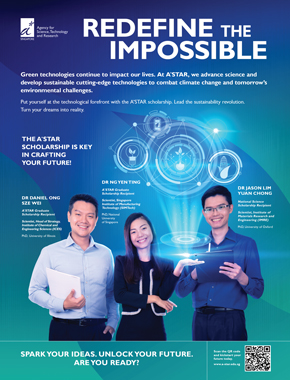In a knowledge-driven economy, research is a career option brimming with opportunities. And at A*STAR, Dr Ng Yen Ting and Dr Alvin Hung have found the best place to further their careers.
“A*STAR was, and remains, one of the few agencies actively funding scholarships for doctoral studies. I was interested in research and foresaw that today’s knowledge-based economy will require people with research skillsets. I have always felt that research is a unique job that allows me to forge new frontiers and develop something where no one has. I still feel the same about research today,” says Dr Hung.
Before Dr Ng took up her graduate studies, she spent time at SIMTech, which gave her an insight into the working relationship between A*STAR and the industry.
“With a good understanding of A*STAR and the gaps in the industry, I started to consider furthering my studies in a world-class university, while working closely with the industry at the same time, as it would allow me to work on real problems. The A*STAR scholarship was able to offer me the best of both worlds,” she adds.
For Dr Ng and Dr Hung, their worlds are at the forefront of technology. At SIMTech, Dr Ng seeks to improve operational efficiency with reduced operational costs and environmental impact. While at the Experimental Drug Development Centre (EDDC), Dr Hung’s multi-disciplinary team supports difficult drug discovery projects by accelerating the process of generating leads.

Dr Ng Yen Ting researches energy and resource efficiency as a Scientist in Planning and Operations Management. She is a recipient of the A*STAR Graduate Scholarship and she holds a Doctor of Philosophy in Sustainable Manufacturing from the National University of Singapore.
Driven by Efficiency
Dr Ng holds a portfolio of diverse roles, which ranges from leading collaborative research projects with universities and industries to coordinating reviews for technology disclosure submissions and leading programmes as part of the Research, Innovation and Enterprise 2020 initiative.
But research is where the magic happens. Her division is currently working on a scalable platform where every aspect of the production system is equipped with contextual sensing elements that use dynamic root-cause-effect analyses to identify and resolve problems as they happen. The system also provides smart predictive capabilities to support decision making.
Dr Ng’s work encompasses optimising and expanding the capabilities of sensors, and she is currently working on a “Mixed Reality” visualisation tool that provides greater insight into energy management. Using physical sensors and power meters along with virtualisation tools, it is possible to monitor temperature and energy data in an accurately simulated, three-dimensional (3D) environment. In the context of an air-conditioned room, we can see whether the room is being cooled efficiently in a 3D space in real time, and take steps to improve efficiency and energy consumption if there are areas of inefficiency.
“The potential energy savings could be in the range of 10%,” says Dr Ng. “Energy cost is one of them; by knowing the threshold limit for the desirable conditions the most energy-saving parameters could be applied. Other savings could come from productivity improvement in manpower costs for data collection to study and monitor air temperature and distribution and resource efficiency.”
Given that air conditioning makes up 30-40% of the energy consumed in a building at Singapore, the potential is immense.
“I believe that solving real problems or human needs has always been the driver for researchers to ensure a better future for everyone,” says Dr Ng, who believes that aside from keeping abreast with the various industries and their developments, students contemplating a research career should look to understand social needs and concerns as the exposure will help them to identify their areas of interest as well as evoke a passion for solving problems. And Dr Ng is certainly thankful for the opportunities she’s had.
“It is my privilege to be an A*STAR scholar and a part of A*STAR, and it motivates me to contribute back to A*STAR. More importantly, I enjoy working in A*STAR’s multidisciplinary work environment,” she tells us.

Dr Alvin Hung, Group Leader and Medicinal Chemistry, Head Fragment-Based screening, Experimental Drug Development Centre (EDDC), looks into new drug discoveries in his course of work. He is a recipient of the National Science Scholarship (BS-PhD) and received his Doctor of Philosophy in Chemistry from Cambridge University and Postdoc from the Broad Institute.
Multidisciplinary Effort
A multi-disciplinary approach is how Dr Hung solves complex puzzles in the field of drug discovery. Dr Hung leads a diverse group of “experienced drug hunters” with years of expertise in pharmaceuticals, involving many teams ranging from discovery groups to the clinical development team.
Dr Hung specialises in Fragment-Based Screening, which is an extension of the work he did during his PhD studies and postdoctoral research at Cambridge, where he learnt from one of the pioneers of the field. Upon joining A*STAR, he set up a Fragment-Based Screening group focused on generating small molecule hits for pushing the drug pipeline.
“A large part of our screening work in drug discovery is both complementary and orthogonal to other screening methods. My work encompasses biophysics, synthetic organic chemistry, and chemical biology. Because of the combination of different fields and use of state-of-the-art equipment, I do believe that we are able to achieve greater efficiencies in certain areas of the drug discovery workflow,” he adds.
The group supports difficult drug discovery projects, using fragment-based screening to “target” previously intractable targets and rapidly generate leads and preclinical development candidate compounds.
“The A*STAR National Science Scholarship for undergraduate and graduate studies has given me the opportunity to pursue my education in science in some of the best universities and biotechnology global hubs worldwide,” says Dr Hung.
For him, the opportunity to learn in the best labs and meeting with like-minded, experienced colleagues and fellows in the field of drug discovery and development has given him the confidence to excel and to grow in his career and personal life.
And he is happy to give back; Dr Hung’s role allows him the opportunity to mentor students as an adjunct Assistant Professor at the National University of Singapore (NUS) where he teaches a drug discovery course.
Dr Hung suggested that students should look beyond the usual boundaries of science, as breakthroughs happen when there are collaborations between different scientific fields: “My advice to students studying chemistry is to look beyond traditional chemistry fields and seek new areas where there could be huge synergistic effects with traditional fields. This places one in a unique position to forge new areas of research which is the key to developing innovative research and technology.”


